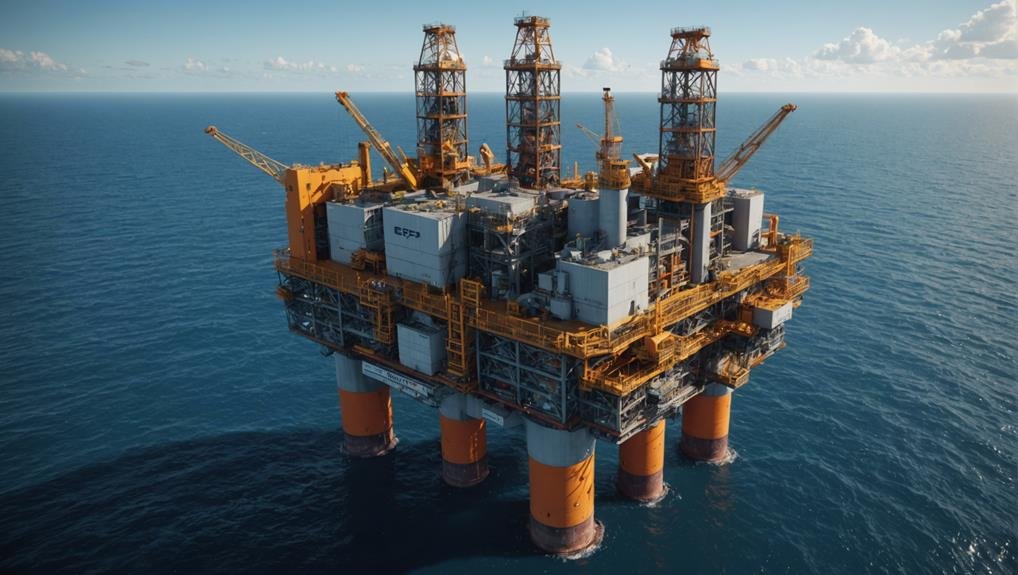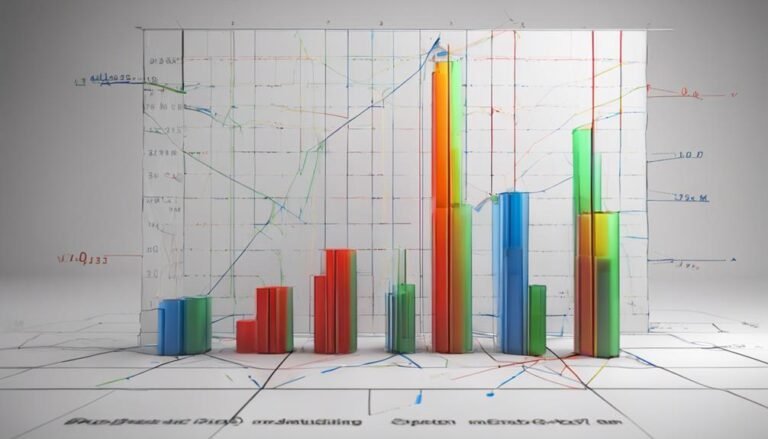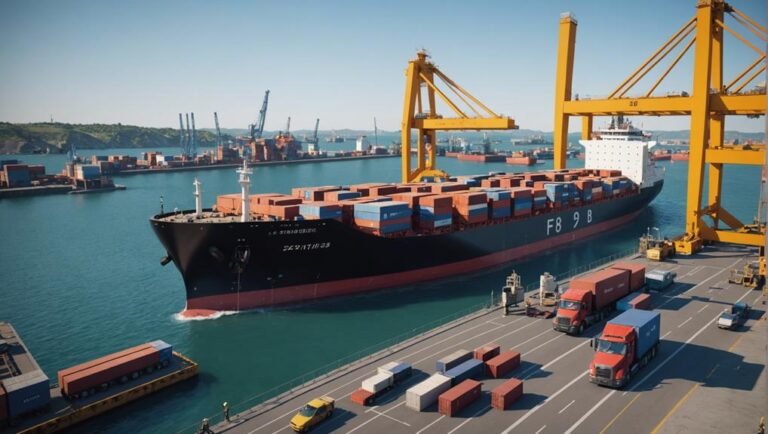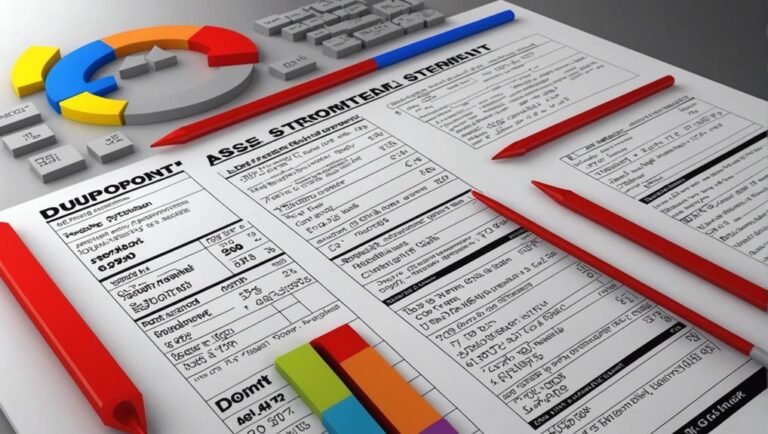Exploration & Production (E&P): Role in Oil and Gas Industry
Exploration and Production (E&P) is crucial in the oil and gas sector as it leads energy extraction ensuring a steady supply. Through geophysical surveys and drilling techniques, potential reserves are identified and resources extracted, optimizing production. E&P contributes to energy security by reducing external dependence and enhancing efficiency with advanced technologies. This process aids in economic growth, job creation, and market stability. E&P also focuses on environmental considerations, promoting sustainability and minimizing negative impacts. Future trends involve technologies like AI and green practices to adapt to market demands. Learn how E&P shapes the industry and its evolving role.
Key Takeaways
- E&P ensures a continuous oil and gas supply.
- Contributes to energy security and independence.
- Drives economic growth and job creation.
- Utilizes advanced technology for efficient extraction.
- Promotes sustainability and environmental responsibility.
Importance of E&P in Industry
Exploration & Production (E&P) plays a pivotal role in the oil and gas industry by spearheading the initial phases of energy extraction through the meticulous search, identification, and extraction of oil and gas resources from the Earth’s subsurface.
Resource extraction, a fundamental aspect of E&P, guarantees a continuous supply of crude oil and natural gas, which are essential for meeting global energy demands. Additionally, E&P contributes greatly to energy security by reducing dependence on external sources and ensuring a stable supply of energy resources.
E&P Process Overview
E&P operations progress through distinct stages, each important for the efficient extraction of oil and gas resources from the Earth’s subsurface. Key components of the E&P process include geophysical surveys to identify potential reserves and drilling techniques to extract these resources. Additionally, reservoir modeling plays a significant role in understanding the underground formations and optimizing production strategies. By utilizing advanced technologies and data analysis, operators can enhance the efficiency of oil and gas extraction processes. The table below provides an overview of the essential elements involved in the E&P process:
| E&P Process Components | Description |
|---|---|
| Geophysical Surveys | Identify potential oil and gas reserves through subsurface imaging techniques. |
| Drilling Techniques | Utilize various methods to extract resources from underground reservoirs. |
| Reservoir Modeling | Analyze underground formations to optimize production strategies. |
| Production Optimization | Enhance efficiency through advanced technologies and data-driven approaches. |
E&P Operations and Phases
The operational success of oil and gas extraction hinges on the meticulous execution of distinct phases essential for efficient resource utilization.
Drilling techniques and reservoir mapping play a significant role in the search and exploration phase, enabling the identification of viable extraction sites.
Well construction involves utilizing advanced drilling methods to assess commercial potential accurately.
During this critical phase, operators often face challenges such as geological uncertainty and the risk of well failure. To navigate these complexities, they rely on comprehensive assessments that ensure the well’s structural soundness.
Well Integrity Analysis plays a vital role in this process, as it ensures that wells are constructed and maintained to avoid leaks and failures, which is crucial for long-term productivity and environmental safety. This analysis evaluates the well’s structural integrity throughout its lifecycle, from drilling to decommissioning.
By employing Well Integrity Analysis, operators can prevent costly incidents, enhance safety, and ensure compliance with environmental regulations, ultimately leading to more efficient oil and gas extraction.
Production optimization techniques are important during the extraction phase to enhance output efficiency.
Well maintenance is essential post-extraction to maintain sustained productivity levels.
By integrating these elements seamlessly, E&P operations can achieve best resource extraction while adhering to industry standards.
Continued focus on refining drilling methods and reservoir assessment technologies further enhances the overall effectiveness of oil and gas extraction processes.
E&P Contribution to Economy
How does the contribution of Exploration and Production (E&P) in the oil and gas industry impact the economy?
E&P plays a significant role in the economy by fostering economic growth, job creation, and resource sustainability. The exploration and extraction activities undertaken by E&P companies generate employment opportunities, ranging from skilled engineers to field technicians, thereby contributing to job creation in various communities.
Additionally, the sustainable management of resources by E&P companies guarantees the long-term availability of oil and gas reserves, supporting the stability of energy markets. Moreover, E&P operations often engage with local communities through social responsibility programs, enhancing community relations and promoting economic development in regions where these activities take place.
This multifaceted contribution demonstrates the crucial role E&P plays in driving economic prosperity and fostering community well-being.
Technology in E&P
Incorporating cutting-edge technological advancements has revolutionized the efficiency and precision of operations within the exploration and production sector of the oil and gas industry. Digital innovation has played a significant role in enhancing processes such as reservoir mapping, drilling optimization, and real-time data analysis.
Utilizing advanced software and data analytics has enabled E&P companies to make informed decisions swiftly, leading to improved productivity and cost-effectiveness. Automation solutions have streamlined various tasks, reducing human intervention in repetitive or hazardous activities.
Robotics and drones are being increasingly utilized for tasks like pipeline inspections and maintenance, enhancing safety and accuracy. These technological advancements continue to drive the evolution of E&P practices, ensuring sustainable and efficient operations in the oil and gas industry.
E&P Environmental Considerations
Environmental considerations play a significant role in shaping the operational framework of Exploration & Production (E&P) activities within the oil and gas industry.
Environmental impact and sustainability practices are important aspects that E&P companies need to take into account for responsible operations.
Key points to take into account include:
- Minimizing Environmental Footprint: Implementing technologies and practices to reduce emissions, water usage, and waste generation.
- Regulatory Compliance: Adhering to environmental regulations and standards to mitigate negative impacts on ecosystems and communities.
- Promoting Biodiversity Conservation: Engaging in habitat restoration and conservation efforts to preserve biodiversity in areas affected by E&P activities.
Future Trends in E&P
Advancements in technology are reshaping the landscape of Exploration & Production (E&P) operations within the oil and gas industry. Innovative techniques such as AI and machine learning are enhancing exploration accuracy and efficiency, leading to the discovery of previously inaccessible resources.
Market dynamics are also influencing E&P trends, with a growing focus on sustainable practices and renewable energy sources. Companies are increasingly investing in green technologies and reducing their environmental footprint.
Additionally, automation and robotics are streamlining production processes, improving safety, and reducing operational costs. The future of E&P will continue to evolve as industry players adapt to changing market demands and leverage cutting-edge technologies to drive efficiency and sustainability in oil and gas exploration and production.
Conclusion
To sum up, the Exploration & Production (E&P) sector serves as the lifeblood of the oil and gas industry, fueling global energy demand through meticulous extraction processes.
Like a skilled conductor orchestrating a symphony, E&P operators navigate the complexities of exploration, well construction, and extraction to extract valuable resources from the Earth.
With cutting-edge technology and a focus on environmental sustainability, the E&P sector continues to drive innovation and efficiency in the quest for energy resources.







